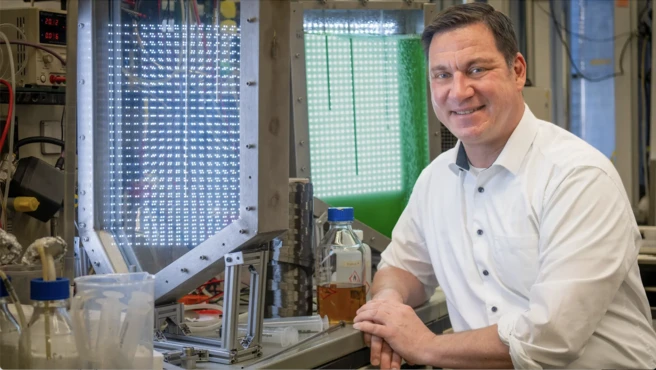Carbon fibers are essential in aviation, wind energy, and lightweight construction. However, since they are based on petroleum, their production has been very harmful to the environment. A research consortium led by the Technical University of Munich (TUM) has now succeeded in developing a production process for carbon fibers from renewable raw materials.
Project coordinator Prof. Thomas Brück, head of the TUM Chair of Synthetic Biotechnology, emphasises: “With the joint GreenCarbon project, we have taken a major step towards sustainable industrial carbon fiber production.” In addition to TUM, the Fraunhofer Institute for Interfacial Engineering and Biotechnology IGB, the company SGL Carbon, and the aerospace group Airbus are also involved in the consortium, which is funded by the Federal Ministry of Research, Technology, and Space (BMFTR).
Novel production process for carbon fibers
Carbon fibers are lightweight, yet extremely stable and resistant. In the form of carbon fiber-reinforced plastics, they are used in a wide variety of applications: in aircraft and vehicles, wind turbines, but also in sports equipment, such as bicycles, tennis rackets, and skis. These lightweight materials are made from acrylonitrile, a raw material that has traditionally been obtained mainly from petroleum-based propylene.
Researchers at the Werner Siemens Chair of Synthetic Biotechnology at the TUM School of Natural Sciences investigated the extraction of oils from photosynthetically active microalgae. “Through photosynthesis, microalgae bind the greenhouse gas CO2, among other things in the form of algae oils,” explains Prof. Thomas Brück. Glycerine was then extracted from these valuable oils using chemical processes.
Fraunhofer researchers have succeeded in developing a process that can be used to catalytically convert biogenic glycerol into acrylonitrile, the key raw material for carbon fiber production. This process has been developed on a laboratory scale at the Straubing branch of Fraunhofer IGB to such an extent that it is now ready for the next scaling step, industrial application. “We have thus created the conditions for the production of sustainable carbon fibers that have the same high-performance properties as conventionally manufactured carbon fibers,” says Dr. Arne Roth, department head at Fraunhofer IGB.
The production of sustainable carbon fibers was the responsibility of industrial partner SGL Carbon, a global leader specialized in the development and manufacture of carbon-based solutions. The company produced 50k heavy-tow carbon fibers, which consist of bundles of 50,000 individual filaments and are mechanically very stable, in accordance with recognized industry standards. These were used to manufacture carbon fiber-reinforced plastics, known as composite laminates.
The European aerospace group Airbus was also involved in the GreenCarbon project as an associate partner. Airbus uses carbon fiber composites as high-performance materials for manufacturing components for aircrafts and helicopters, and investigates processes that enable more sustainable production of these materials from renewable raw materials.
Airbus therefore conducted a technology screening and conducted a life-cycle assessment of the various technology options, in particular. Inspired by the good results, Airbus is working on demonstrating the technology for flying vehicles. For instance, the maiden flight of a research helicopter made from carbon fibers from renewable sources took place in 2024, proving the suitability of these technologies for aviation applications.
Further research and development needed
Building on the promising results of the GreenCarbon project, the partners now want to optimize the technology and bring it into widespread industrial use. According to the researchers, the new manufacturing process can in principle also be used for the sustainable production of acrylic acid, a building block for many polymers that are still produced from fossil raw materials today.
“Our GreenCarbon value chain thus offers new potential for the raw materials transition in the chemical industry, especially in the production of carbon-based high-performance materials,” says Brück. The consortium hopes to receive renewed funding for the follow-up project from the BMFTR.
Publications
- Keil L, Qoura F M, Breitsameter J M, Rieger B, Garbe D, Brück T B. Evaluation of Chemical and Physical Triggers for Enhanced Photosynthetic Glycerol Production in Different Dunaliella Isolates. Microorganisms 2024, 12, 1318. https://doi.org/10.3390/microorganisms12071318
- Melcher F, Vogelsang F, Haack M, Masri M, Ringel M, Roth A, Garbe D, Brück T. Lipase-mediated plant oil hydrolysis - Towards a quantitative glycerol recovery for the synthesis of pure allyl alcohol and acrylonitrile, European Journal of Lipid Science and Technology 2023, https://doi.org/10.1002/ejlt.202200196
- Koruyucu A, Blums K, Peest T, Gniffke A, Brück T, Weuster-Botz D. (2022) Biotechnological Production of Microbial Oils from Carbon Dioxide Using Microalgae and Oleaginous Yeasts in an Integrated Process. Chemie Ingenieur Technik, Pages 1249-1250, doi.org/10.1002/cite.202255064
- Schädler T, Thurn AL, Brück T, Weuster-Botz D. (2021) Continuous Production of Lipids with Microchloropsis salina in Open Thin-Layer Cascade Photobioreactors on a Pilot Scale, Energies, Volume 14, Issue 500; https://doi.org/10.3390/en1402050
- Arnold, U., Brück, T., De Palmenaer, A., & Kuse, K. (2018). Carbon Capture and Sustainable Utilization by Algal Polyacrylonitrile Fiber Production: Process Design, Techno-Economic Analysis, and Climate Related Aspects. Industrial & Engineering Chemistry Research, 57(23), 7922-7933. https://doi.org/10.1021/acs.iecr.7b04828
- Arnold, U., De Palmenaer, A., Brück, T., & Kuse, K. (2018). Energy-Efficient Carbon Fiber Production with Concentrated Solar Power: Process Design and Techno-economic Analysis. Industrial & Engineering Chemistry Research, 57(23), 7934-7945. https://doi.org/10.1021/acs.iecr.7b04841
Scientific contact:
Prof. Dr. Thomas Brück
Technical University of Munich (TUM)
Department of Chemistry
Werner Siemens-Chair of Synthetic Biotechnology
Vice Dean Research and Innovation TUM School of Natural Sciences
+49-89-289-13253
brueck@tum.de
Technical University of Munich
Corporate Communications Center
- Ulrich Meyer
- ulrich.meyer@tum.de
- +49 89 289 22779
- presse@tum.de
- Teamwebsite
Original article: https://www.tum.de/en/news-and-events/all-news/press-releases/details/sustainable-carbon-fibers-based-on-algae
